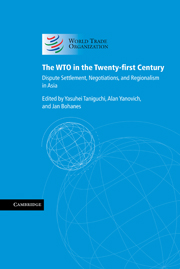Book contents
- Frontmatter
- Contents
- Notes on contributors
- Acknowledgements
- Table of dispute settlement cases and reports
- List of abbreviations
- Introduction
- PART I The WTO at Ten
- PART II Accomplishments and Future Prospects of the WTO Dispute Settlement System
- PART III Asian Perspectives on WTO Dispute Settlement
- PART IV The Doha Development Agenda and Beyond
- 16 The central place of market access for the WTO's development round
- 17 Agricultural issues in the Doha Development Agenda negotiations
- 18 Beyond Doha: reflections on the future of trade remedies
- 19 Reflections on the relationship between WTO negotiations and dispute settlement: lessons from the GATS
- 20 Trade in services and sustainable development in the context of the WTO: the case of higher education
- 21 The WTO and sustainable development
- PART V Asian Regional Integration and the Multilateral Trading System
- Index
16 - The central place of market access for the WTO's development round
from PART IV - The Doha Development Agenda and Beyond
Published online by Cambridge University Press: 05 March 2012
- Frontmatter
- Contents
- Notes on contributors
- Acknowledgements
- Table of dispute settlement cases and reports
- List of abbreviations
- Introduction
- PART I The WTO at Ten
- PART II Accomplishments and Future Prospects of the WTO Dispute Settlement System
- PART III Asian Perspectives on WTO Dispute Settlement
- PART IV The Doha Development Agenda and Beyond
- 16 The central place of market access for the WTO's development round
- 17 Agricultural issues in the Doha Development Agenda negotiations
- 18 Beyond Doha: reflections on the future of trade remedies
- 19 Reflections on the relationship between WTO negotiations and dispute settlement: lessons from the GATS
- 20 Trade in services and sustainable development in the context of the WTO: the case of higher education
- 21 The WTO and sustainable development
- PART V Asian Regional Integration and the Multilateral Trading System
- Index
Summary
The Uruguay Round agreements that established the World Trade Organization (WTO) and the rules-based system as a single undertaking represented a quantum leap forward in the history of the General Agreement on Tariffs and Trade (GATT) and the WTO. It was an immensely complicated undertaking to simultaneously negotiate and reach agreement in such complex areas as intellectual property protection, designing a workable approach to governing trade in services, developing an agreed approach to measuring support to agriculture and disciplining trade-distorting investment measures. It was also not a simple task to elaborate the structure of the WTO as an institution. Of course, the crowing jewel was the new understanding on dispute settlement which, over the past ten years, has proven to be the most effective system of international dispute settlement the world has ever seen. With all of that on the table, in additional to more traditional market access and trade regulation issues, no one was surprised that the Uruguay Round took an extra three years to conclude and that the subsequent implementation of the many different agreements has sometimes presented special problems to the Members of the WTO.
I begin my discussion of major issues in the Doha Development Agenda negotiations with this brief recollection of the Uruguay Round in order to drive home a very important point at the start of this chapter. The Doha negotiations are very different from the Uruguay Round. This is a market access round, not a round involving the introduction and elaboration of complex new rules like the last round.
- Type
- Chapter
- Information
- The WTO in the Twenty-first CenturyDispute Settlement, Negotiations, and Regionalism in Asia, pp. 319 - 327Publisher: Cambridge University PressPrint publication year: 2007



